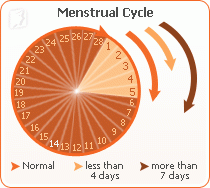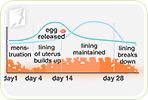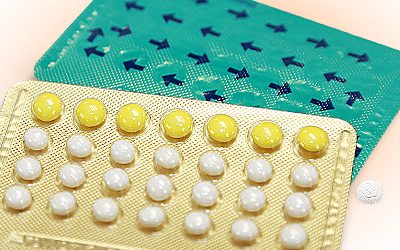
The definition of an irregular period is relative, not just compared to what is considered a "regular period," but also to what is regular for the individual woman. That being said, only 10% of women operate on the average 28-day cycle, with three days of two-and-a-half tablespoons of blood loss. For most women, a normal cycle can be between 24 and 34 days in length with two to seven days of menstrual bleeding and blood loss of two to three tablespoons.
The average woman will have between 11 and 13 periods each year. Because the menstrual cycle and period are controlled by hormones, irregular periods are often the result of fluctuating hormones.
What Are the Signs of an Irregular Period?
As mentioned above, an irregular period varies depending on women's individual cycles. Symptoms of irregular periods include:

- Missed periods
- Extra periods
- Painful periods
- Long or short periods
- Heavy or light flow
How Does My Diet Affect My Periods?

In most cases, eating a little more or a little less of one food or another will not impact your menstrual cycle. However, your diet can impact how you feel while on your period. For example, eating a lot of junk food and drinking soda can make a woman feel bloated and increase menstrual pain while she is on her period. Caffeinated products can increase breast tenderness and anxiety, especially around that time of the month. Eating a healthy, balanced diet can help you feel better overall, including when you are on your period.
More severe changes in eating habits can alter your menstrual cycle. Losing or gaining a significant amount of weight or having an eating disorder can cause irregular or disrupted menstrual cycles. If you think you may have an eating disorder, it is important to talk to a health professional because eating disorders can have serious negative consequences on a person's overall health and well-being.
How Does Physical Activity Affect My Irregular Period?

Moderate physical activity usually should not impact your menstrual cycle greatly. However, frequent and intense workouts can cause missed periods. Putting in a lot of exertion into an activity, such as running a marathon, can cause your period to be delayed or missed. This should not deter you from doing the exercise that you want to do, but it is a good idea to talk to a healthcare professional about how you can get the nutrients that you need in order to be healthy while partaking in an exercise regimen.
Learn More about Irregular Periods
If your irregular periods are worrying you, appear along with other symptoms, or you feel like they may be a symptom of an underlying medical condition, it is recommended to see a doctor. Your gynecologist or primary care physician will be able to give you the proper guidance, diagnosis, and treatment.
Sources
- Mayo Clinic Staff. (2013). Menstrual cycle: What's normal, what's not. Retrieved November 10, 2015, from http://www.mayoclinic.org/healthy-lifestyle/womens-health/in-depth/menstrual-cycle/art-20047186
- National Health Service UK. (2015). Irregular Periods. Retrieved November 10, 2015, from http://www.nhs.uk/Conditions/Periods-irregular/Pages/Introduction.aspx



